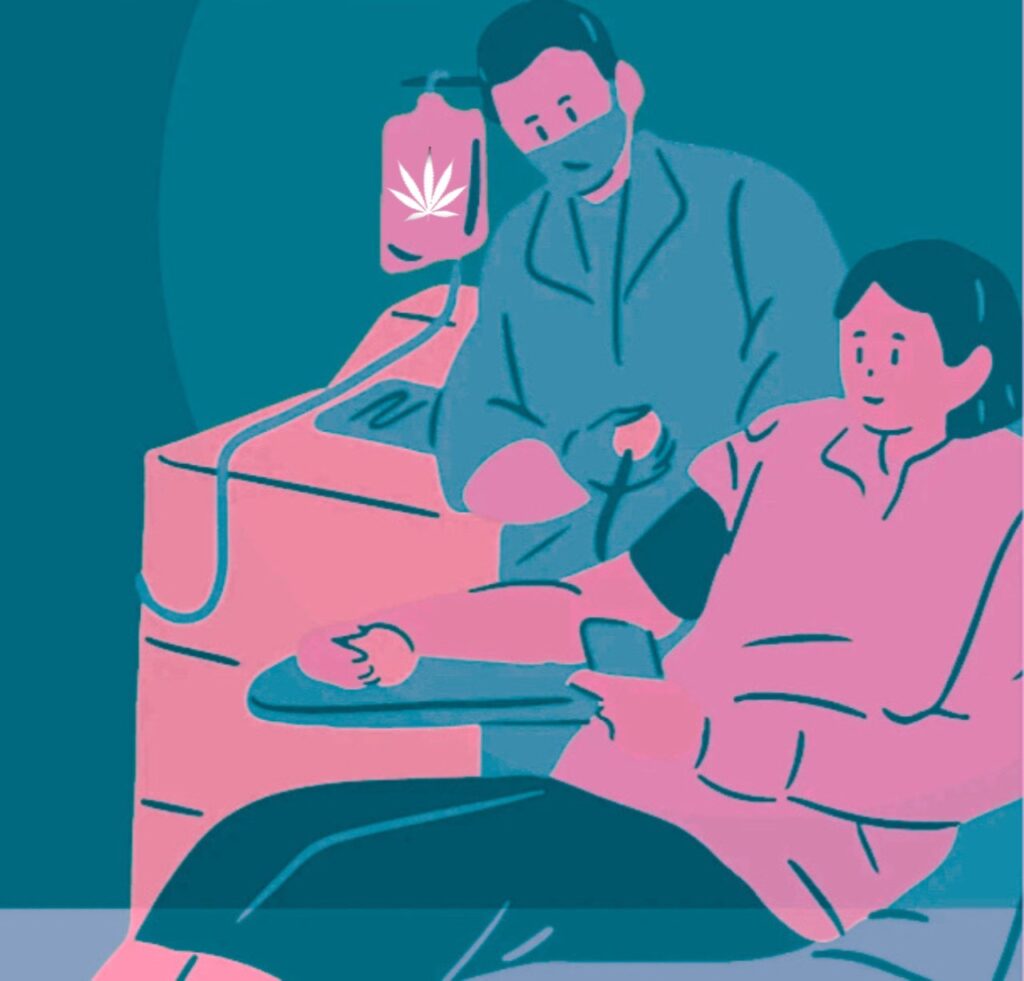
High on Health: Can marijuana reduce blood pressure? A New Study Examines the Connection
With its legalization in many regions, cannabis is becoming an important subject of interest for medicinal and recreational purposes. Its potential impact on blood pressure is one area of interest. Recent research by Alexandre Vallée and his team suggests that cannabis may potentially lower blood pressure, particularly in women. However, caution is vital, particularly for those suffering from medical conditions.
“My blood pressure went back to being somewhat low.”
-Adelynne Martin
The story of Adelynne Martin emphasizes the significance of blood pressure monitoring, particularly for people with other health conditions. At 21, college student Martin was admitted to a detox facility for substance abuse with low blood pressure. Her blood pressure was alarmingly low at 90/40 at her checkups, necessitating medication from the rehab center staff to control it. Martin kept a close eye on her blood pressure readings, and over time, began to normalize. Her blood pressure, which was 120/70 at the end of her rehabilitation program, had returned to normal. ” Although not to the same extent, it was lower than when I left rehab. My blood pressure went back to being somewhat low,” Martin says. She attributes this improvement to the fact that she hasn’t smoked cannabis in years. Also, this experience shows how important it is to talk to a doctor before using cannabis for health reasons.
Vallée and his partners dissected information from more than 91,000 individuals in the UK Biobank populace who detailed involving marijuana and their circulatory strain readings for the review. Both men and women had lower systolic and diastolic blood pressure levels when using cannabis for an extended period of time, with women experiencing a more pronounced effect. Cannabis may have potential benefits for controlling blood pressure, according to these findings.
Although marijuana use may positively affect blood pressure, there are concerns about its potential negative impact on cardiovascular health. According to studies, smoking cannabis has been linked to increased heart rate and changes in blood pressure. People who already have cardiovascular issues like high blood pressure or a history of heart disease may find this particularly troubling.
“Quitting can cause physical dependence and withdrawal symptoms.”
Dr. Leomaris Trujillo, Physician.
Dr. Leomaris Trujillo, a physician based in Daytona, warns that marijuana addiction is possible. “Quitting can cause physical dependence and withdrawal symptoms,” says Dr. Trujillo, advising people with underlying medical conditions to seek medical advice before using cannabis for health reasons and warning against the dangers of cannabis use.
The American Heart Association advises exercising caution when using cannabis for medical purposes. With the rise in popularity of marijuana use, both recreational and medical marijuana use has skyrocketed. Individuals with preexisting medical conditions should seek medical supervision and guidance. “Most of the available data are short-term observational studies,” says Kim James, who works the AHA hotline. James emphasizes the importance of maintaining a healthy lifestyle, including regular exercise and a balanced diet, for enhancing cardiovascular health.
Marijuana use has been linked to cardiovascular diseases like myocardial infarction, cardiac arrhythmias, cardiomyopathies, stroke, arthritis, and sudden death in case reports and studies. The National Center for Biotechnology Information will publish a study in 2020 titled “The Impact of Marijuana on the Cardiovascular System: A Review of the Most Common Cardiovascular Events Associated with Marijuana Use” provides a basic understanding of the physiological effects of marijuana on the cardiovascular system and a review of the existing literature on cardiovascular diseases associated with adult marijuana use. The majority of marijuana-related cardiovascular events occur in young, healthy men with no cardiovascular risk factors, according to the authors. However, it is anticipated that older patients will be added to this patient population in the future. Other cannabinoid receptors in the sympathetic and parasympathetic nervous systems, which are involved in thrombosis, inflammation, and atherosclerosis, are said to be affected by different doses of cannabis, according to the study.
“Check with your doctor.”
Kim James, American Heart Association Hotline Operator.
Cannabis use should be used with caution, particularly in people with underlying medical conditions, even though it may potentially control blood pressure, particularly in women. James emphasizes the significance of seeking medical advice before using marijuana to treat low blood pressure. “Check with your doctor because he’ll know your overall health and how anything will affect you,” she says. In addition, the method of consumption and the kind of cannabis product used should be taken into account because different sorts of cannabis can have other effects on cardiovascular health.
Various techniques for using marijuana can affect cardiovascular health. Edibles are cannabis-infused food products that are consumed orally. They take longer to take effect than smoking, and the effects can last longer and be more intense. This may increase the risk of overindulging, which can have adverse effects on the cardiovascular system. It’s important to note that controlling THC and CBD dosages in edibles can be difficult, which can increase the risk of side effects. Vaping is another method of cannabis consumption that has become popular, but concerns have been raised about its potential adverse effects on cardiovascular health. People should know that cannabis products and consumption methods can affect blood pressure differently. Before utilizing weed, people with hidden ailments like low circulatory strain ought to intently screen their levels and look for clinical exhortation. While smoking has been the traditional method for consuming cannabis, other techniques such as edibles and vaping have gained popularity in recent years. However, it is important to understand how these different methods can impact cardiovascular health.
“It’s critical to partake carefully and look for clinical guidance before using it.”
Dr. Leomaris Trujillo, Physician
The experience of Adelynne Martin emphasizes the significance of blood pressure monitoring, particularly for individuals with underlying health issues. People who use cannabis for health reasons should know that it can lead to physical dependence and withdrawal symptoms. Therefore, it is essential to seek medical advice prior to using cannabis for health reasons, particularly for individuals who have underlying medical conditions. Clinical experts like Dr. Leomaris Trujillo warn against the risks of pot use. ” While marijuana might have possible benefits for some people, it’s critical to partake carefully and look for clinical guidance before using it,” says Dr. Trujillo. ” Our overall health must come first, and we must make well-informed choices regarding our healthcare.”




